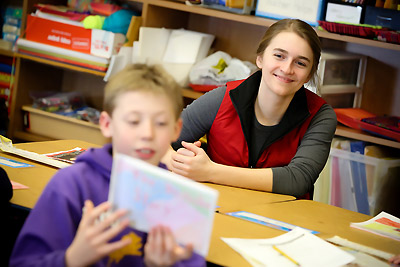
1. Community Service (Volunteerism) involves students in service to a formal community agency or non-profit organization, a business, or an informal community group for the purpose of filling a community-defined need. Students benefit from these types of experience by learning firsthand the value of service, the strength gained within a community by diverse community members, and the values of care and compassion. No minimum hours.
2. Civic Engagement involves students in taking action to contribute to the civic processes within their community. These actions may spring from the community or from the university classroom but should always engage students in making an actual impact on political and civic processes. Students benefit from civic engagement by becoming more active and committed to the processes that sustain our democracy. 4 hour minimum.
3. Service Learning involves students in projects that fulfill both community needs and academic objectives. These projects find a point of shared contact between the academic content of the course and needs articulated by the surrounding community. Reflection on the process and the outcomes of these projects is a crucial component of these types of experiences. 10 hour minimum.
4. Community-Based Problem Solving engages students in long term and more complex projects designed to solve specific community-articulated needs. The aim of these projects is always to present, and hopefully implement, actual solutions to real community problems. Only the problem itself needs to come from the community; the approach to the problem and proposed solutions may originate entirely from the students involved in the project or may be developed in collaboration with appropriate community members. 20 hour minimum.
5. Leadership Development engages students in an intentional effort to foster and/or enhance learning, growth and change. Leadership development experiences should provide students with an opportunity to explore their own potential for leadership in addition to expanding their capacity to perform formal or informal leadership roles within an organization or group. 10 hour minimum.
6. Other Activities: This category is designed to include activities that are engaging but do not fit the previous categories. Examples of activities within the “Other” category could include internships, research projects, engagement activities completed in a course not meeting one of the above categories, etc. 20 hour minimum.




